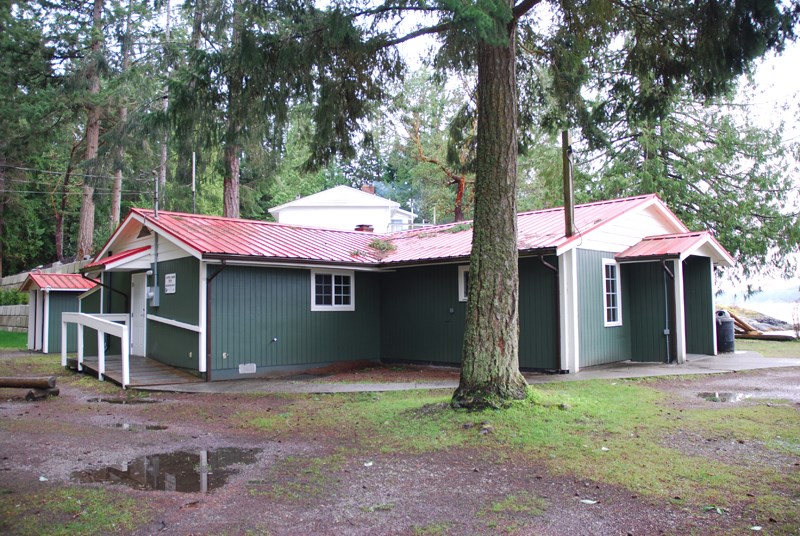As construction costs continue to soar, a community hall project on the Sunshine Coast is being hit with a bigger price tag than originally estimated, and regional district staff are asking directors how to proceed.
The project that would see the replacement of Coopers Green Hall in Halfmoon Bay has recently seen its cost estimate go up by nearly $1 million ($983,000, to be exact) and total debt funding would increase up to $1.5 million.
A presentation scheduled for a May 19 Sunshine Coast Regional District (SCRD) meeting will report the estimated total project budget for the replacement of Coopers Green Hall is now $4,071,020.
Halfmoon Bay Community Association (HBCA) president Linda McMahon said the association was not surprised that the costs went up, but “were surprised that it was that much.”
The report, available in the agenda ahead of the meeting, states inflation has reached a 30-year high. When comparing March 2022 to March 2021, inflation increased by 6.7 per cent. A 2022 estimate includes a projected 5.3 per cent construction escalation to a project start in the first quarter of 2023.
“Given the volatility of the construction market and risks associated with the project, staff recommend an additional ~10% contingency, which would bring the total project budget to a maximum of $4,500,000, making the funding gap just over $1.4 [million],” the report states.
Available funds
When the board of directors officially approved the project go ahead last year, the estimated cost was $3.1 million. Some funding streams included $2 million in grants from senior governments; a maximum contribution of $528,378 from the SCRD, approved in its 2021 budget; and more than $345,000 in community donations as of last July.
In the 2022-2026 Financial Plan, $3,061,669 was carried forward for the project.
The HBCA has not been actively fundraising since about November, as they await an update from the SCRD. If the SCRD decides to go to tender for the project, the fundraising would begin again.
“There is a desire to contribute, but we need the SCRD to say they're going to build the hall,” McMahon said. “There's no point going and asking people for money for a hall they don't know is going to be built.”
A replacement project for the Halfmoon Bay community hall has been in the works for years, and community consultation began in 2016. An Investing in Canada infrastructure Program (ICIP) grant to a maximum of $2,013,641 (73.3 per cent of the eligible costs) was approved in 2020, as long as the project was complete by March 31, 2025.
Costs not included
While the HBCA wasn’t privy to the report before it was included in the agenda for the upcoming meeting, McMahon said they have been in discussions with SCRD staff for the hall’s operational plan, and knew the costs included in the report would be about the building itself.
There are costs that have not yet been included in the estimate, such as the board’s direction to plan for a parking management strategy, and to enhance the park, hall and boat ramp parking infrastructure. There could be archaeological costs added during the project, and the report states additional contingency value could be added. The past eight months have also been exploring how to make the project net zero-ready, as per board direction.
What are the options?
On May 19, directors will be presented with five options:
- To continue with the designed project and approve an amended project budget up to $4.5 million.
- To continue with the designed project and initiate an electoral approval process for long-term borrowing.
- Redesign the project so it can be constructed within the approved budget of $3,088,020.
- Delay the project for the foreseeable future.
- Cancel the project and continue to use the existing hall “until the end of its useful life.”
The last option, the report states, carries a “reputational risk” and the donated funds would have to be held in a trust, which may not be received well by the community.
The HBCA is slated to appear as a delegation at the May 19 meeting, where Andy Jones-Cox will give a presentation. When asked what their preferred option is, McMahon said it depends on who you talk to in the community. The HBCA is hoping for the first option, to continue with the project designed as-is, to make the hall a community and regional hub. McMahon acknowledged there are some people in the community who cannot justify the cost, which she understands.
“After all the money that has been spent… all of the fundraising that the community has done, all of the expectations of members of the community, it would be a darn shame to not have this thing go forward,” McMahon said.
“The building has served its purpose, it's very much the worse for wear.”




